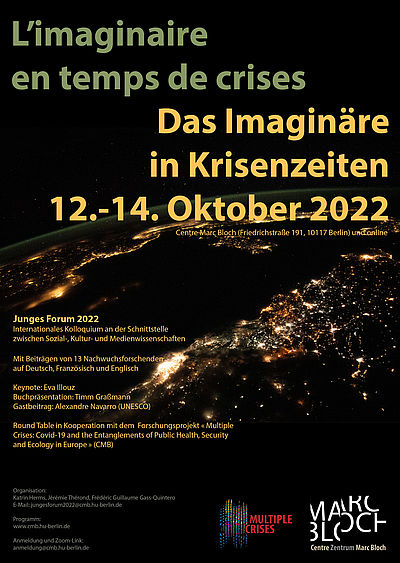JungesForum 2022: Das Imaginäre in Kisenzeiten
12. Oktober | 13:00
Internationales Kolloquium an der Schnittstelle zwischen Sozial-, Kultur- und Medienwissenschaften
Since more than a decade, we live in a repetitive loop of overlapping global challenges: the 2007 financial crisis, the so called “immigration crisis”, climate change, the corona pandemic, and most recently the Russian invasion in the Ukraine are only some of the most mediated examples. This context of multiple crises on the global scale impacts local realities in different ways. It may be seen as a permanent threat calling for immediate institutional action, but also as a chance for social change and emancipation in the shape of social movements and deliberative public debate.
As the very moment of crisis is typically undefined and characterized by discontinuity, insecurities and a loss of orientation, various actors enter the stage in times of crises in order to understand, redefine and collectively overcome the perceived disorder. Stories about the past and the envisioned future pop up and evolve in that process of meaning making.
We wish to argue that social imaginaries play an important role in that interpretation battle, which the sociologist Todd Nicholas Fuist refers to as “shared images and archetypes of a group of people that allows them to think collectively” (2021: 358). This approach draws attention to circulating symbols and slogans, memories and dreams within a society and to identify concepts shared across borders.
This conference brings together 13 young researchers in the humanities, social sciences and cultural studies mobilizing the concept of the "social imaginary" in concrete analyses of crisis phenomena in different world regions. Presenting in English, German and French, their work sheds light on social practices and media representations, networks and art shaping narratives of identity, dystopia, hope or justice – in Europe, Africa, and beyond.
Highlights
We particularly welcome our Keynote Speaker Eva Illouz on Wednesday, 12.10., at 6:30 pm with her talk “What’s Crisis: Preliminary Reflections on Love”. To attend this Keynote in person at Centre Marc Bloch in Berlin, please register here.
Another highlight is the Round Table “Public Health and Climate Change: The role of imaginaries in coping with multiple crise” on Thursday, 13.10., at 5:30 pm, organized in cooperation with the research project "Multiple Crises: Covid-19 and the Entanglements of Public Health, Security and Ecology in Europe" (CMB).
We are also looking forward to our two invited guest speakers Timm Graßmann with his book presentation: “Der Eklat aller Widersprüche”, and Alexandre Navarro (UNESCO): “Réseau-monde : une transformation des coopérations culturelles Est-Ouest".
Teilnahme
The whole event is open to all at Centre Marc Bloch (Friedrichstraße 191, 10117 Berlin)
and online via Zoom:
https://us02web.zoom.us/j/84941881881?pwd=OVlEbmoxanlWaUJiSG56M0VEWTVhQT09
Meeting-ID: 849 4188 1881
Kenncode: 049458
Organisation
Katrin Herms, Jérémie Thérond, Frédéric Guillaume Gass-Quintero
Kontakt
jungesforum2022@cmb.hu-berlin.de
Ort
Centre Marc Bloch & Online
Programm
Mittwoch, den 12. Oktober
13.00 -14.30 Empfang, Grußwort und Einführung
Opening remarks by Maïwenn Roudaut, Centre Marc Bloch
Katrin Herms: Why study social imaginaries in the context of crises?
14.30 - 16.00 Media representations and stereotypes
Henning Fauser: Approches méthodologiques pour étudier l'imaginaire collectif
Ebrottié Vincent N'ZO: Die deutsche Presse und der afrikanische Migrant: welche Darstellung? Am Beispiel des Nachrichtenmagazins „Der Spiegel“
Chair: Marieke Louis
16.30 - 18.00 Everyday crisis narratives
Sylvestre Kouakou: Afrikavorstellungen von ausgewählten Afrikakorrespondenten deutschsprachiger Medien und Literatur
Jérémie Thérond: Subjectivités, relations amoureuses et incertitude ontologique : l’idéalisation paradoxale des aînés chez des jeunes femmes à Lomé (Togo)
Chair : Amadou Dramé
18.30 - 20.00 Keynote
Eva Illouz: What’s Crisis : Preliminary reflections on Love
Donnerstag, den 13. Oktober
09.30 - 11.00 Identity and mobilization
Rahmi Oruç: Association and dissociation of Self in Generation Z Crisis Narratives in Turkey
Yvan Issekin : Revendiquer sa carte nationale d’identité sans descendre dans les rues : les trajectoires du mouvement #JeVeuxMaCNI au Cameroun (2020-2022) (online)
Chair : Nazan Maksudyan
11.30 - 13.00 Dystopia and social media
Dusan Bozalka : Etude des écosystèmes complotistes actifs sur Twitter et Telegram à l’aune de la guerre Russo-Ukrainienne
Oleksandra Kuzmenko : Zwischen post-nuklearem Spiel und Atomkriegsbedrohung: der post-apokalyptische Diskurs in Ukranischen Medien
Chair: Camille Roth
14.00 - 15.30 Politics, State and economy
llias Naji : La crise de la protection : des produits d’imaginaires politico-financiers
Timm Graßmann : Wozu erforschen wir Krisen ? Am Beispiel Marx. Buchpräsentation zu Der Eklat aller Widersprüche
Chair : Fabian Lemmes
17.30 - 19.00 Roundtable Public Health and Climate Change
Round table in Kooperation mit dem Forschungsprojekt "Multiple Crises : Covid-19 and the Entanglements of Public Health, Security and Ecology in Europe"
The role of imaginaries in coping with multiple crises
Freitag, den 14. Oktober
09.30 - 11:00 Migration, mobility, spaces
Paula Seidel: Die Imagination einer jugoslawischen Nation: Zukunftsentwürfe Intellektueller in London während des Ersten Weltkrieges
Alica Vogt: Des opérateurs culturels dans la « crise migratoire » : s’engager pour vivre ensemble. L’orchestre du projet Migrants Music Manifesto (Europe créative) à Cologne en septembre 2022
Chair : Nikola Tietze (online)
11.30 - 13.00 Cultural imaginaries and their political potential
Britta Breser: Krisengeschichten der Kunst als Orte demokratischer Bildung
Alexandre Navarro (UNESCO): Réseau-monde : une transformation des coopérations culturelles Est-Ouest (online)
Chair : Boris Grésillon
14.00 - 15.00 Schlussdiskussion
